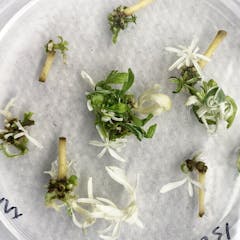
Articles on Agriculture
Displaying 821 - 840 of 1451 articles

Robotic milkers, video cameras and even sensors hidden inside the body will help this dairy farm figure out how to get the most milk from their cows.

Desertification is a problem of global proportions. If action isn’t taken now, it will accelerate and fuel further migration and conflict.

The Mediterranean fruit fly can evolve rapidly to different environmental conditions, this suggests it will be well suited to cope with climate change.

Many people who live near large-scale livestock farms complain about noxious smells, air and water pollution and health risks. With little help from regulators, they are turning to lawsuits.

Crop insurance cushions farmers against natural disasters, but it also can lead them to overuse resources and reduce their incentive to adapt to climate change.

US farmers are planting more and more acres with seeds coated with neonicotinoid pesticides. An ecologist explains why this approach is overkill and may be doing more harm than good.

A researcher takes a closer look at the millions of unauthorized workers who play an essential role in the U.S. economy – and why they matter.

Foraging and gathering food can play a huge role in feeding people.

The powerful ideological connection between Australia and agriculture is being increasingly scrutinised. A spate of recent books have recast basic assumptions about our relationship to the land.

As atmospheric carbon dioxide levels rise, rice plants produce fewer vitamins and other key nutrients. This could worsen hunger, malnutrition, child stunting and other diet-related health problems.

South Africa’s land reform debate must not lose sight of the real issue: how to provide enough food to feed its people.

South Africa urgently needs to rethink its existing agricultural model.

Did Rachel Carson catalyze the organic farming movement, as many advocates claim? Or would she reject their ban on synthetic fertilizer and see organic as an inefficient way to feed the world?

The failure of political systems is the main cause of conflict and displacement but climate change can exacerbate this.

Chemical companies touted synthetic insecticides and herbicides as miracle products in the 1940s and 1950s. But farmers and cropdusting pilots didn’t always buy the sales pitch.

Honeybees receive a lot of attention, but the first North American bee to be listed as an endangered species is a wild bumble bee. Wild bees are vital pollinators, and some are declining rapidly.

GMO crops have been rejected by many countries and consumers. Now, an international team of researchers are creating better crops using DNA editing–without inserting foreign genes into the plant.

Producing ammonia, which is a key ingredient in fertilizers, is one of the world’s most energy-intensive chemical manufacturing processes. Now there’s a new low energy option in development.

Africa’s declaration to boost agriculture on the continent has seem some progress but a lot still needs to be done.

We found that even when women own land, their husbands are still perceived as household heads.
